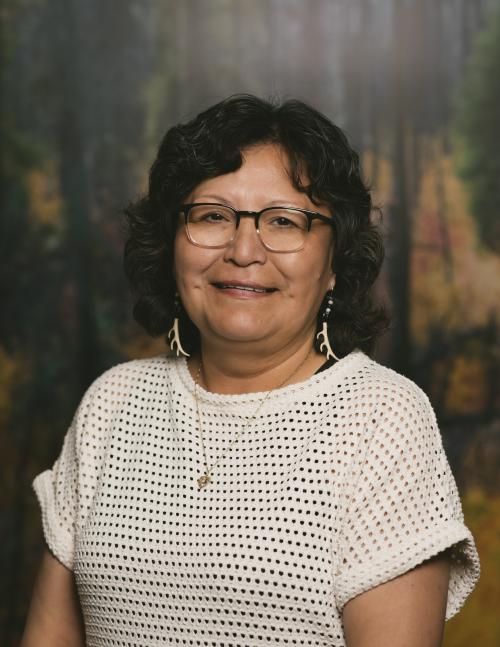Elizabeth Wright, from Fort McPherson, is the daughter of the late Johnny Charlie Sr and the late Jane Charlie Sr. Liz has been married to Dennis Wright for 27 years, and together they have raised seven children and have 14 grandchildren.
She grew up in a large family, and also thanks her siblings for encouraging her to strive for the best.
In Liz’ younger years, she spent a lot of time on the land with her parents until she was a teenager. Her upbringing included learning traditional practices such as hunting and trapping, harvesting fish, caribou as well as berry picking and sourcing fresh water from nearby mountains, which deepened her understanding of the land's value and the need to protect it for future generations.
In 1998, she began working with the Renewable Resources Council in Fort McPherson. This role allowed her to collaborate with the Gwich’in Renewable Resources Board in Inuvik, the federal Department of Fisheries and Oceans, and other various departments, gaining valuable insights into resource management and the needs of local harvesters who relied on hunting, fishing, and trapping for their livelihoods. This position helped her appreciate the importance of supporting and assisting those who depend on the land to support their families, which later influenced her work on the board.
Liz’s journey to her current role on the Gwich’in Land and Water Board began in 2007, when she was approached by the late Tom Williams and past president of the Gwich’in Tribal Council, Freddie Carmichael to join the board. She told them she didn’t think it was the right opportunity for her at the time and turned it down, but the following year they asked her again and reassured her plenty of training and support would be made available.
She accepted the appointment, and went through extensive training, including administrative law and hearing panel skills.
Since her appointment in 2007, Liz has served three-year terms off and on before becoming chair in 2012. Her tenure has been marked by a commitment to ensuring that land use permits and water licenses issued by the board protect the land.
“I think the importance of this board is to make sure that there's no one or no organization or no company just using the land and not taking care of it,” she said, such as making sure the water is not being polluted or the land left in a mess.
One of Liz’s goals on the board is to enhance community awareness about the Gwich’in Land and Water Board and its role in protecting the land and water. She believes in the importance of educating the community about the board’s work to inspire younger generations to consider board participation and continue the stewardship of their natural resources.
Liz is proud of her work on the board but does not single out specific projects as being more important than others. She values all projects equally, as they all contribute to the protection and management of the land and water.
